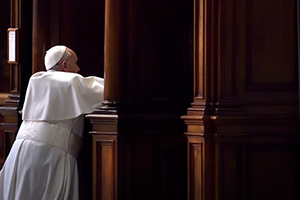Catholics in southeastern Wisconsin will have the opportunity to participate in “24 Hours for the Lord,” a worldwide initiative Pope Francis included as part of the Year of Mercy observance, at 13 sites March 4-5 and at another March 11-12. (See accompanying list)
 Pope Francis goes to confession during a Lenten penance service in St. Peter’s Basilica at the Vatican March 13, 2015. As part of the Year of Mercy, the pope has asked dioceses throughout the world to observe “24 Hours with the Lord” with an emphasis on the sacrament of reconciliation. (CNS photo/Stefano Spaziani, pool)The focus of “24 Hours for the Lord” is the invitation and opportunity for Catholics to receive the sacrament of reconciliation.
Pope Francis goes to confession during a Lenten penance service in St. Peter’s Basilica at the Vatican March 13, 2015. As part of the Year of Mercy, the pope has asked dioceses throughout the world to observe “24 Hours with the Lord” with an emphasis on the sacrament of reconciliation. (CNS photo/Stefano Spaziani, pool)The focus of “24 Hours for the Lord” is the invitation and opportunity for Catholics to receive the sacrament of reconciliation.
“Let us place the sacrament of reconciliation at the center once more in such a way that it will enable people to touch the grandeur of God’s mercy with their own hands,” Pope Francis wrote in “Misericordiae Vultus” (The Face of Mercy), the bull of indiction for the Year of Mercy. “For every penitent, it will be a source of true interior peace.”
Rich Harter, director of the archdiocese’s John Paul II Center for the New Evangelization, sees “24 Hours for the Lord” as an “evangelizing effort.”
“By trying to post the schedules, by having multiple sites, by creating an open experience that anyone can come to, it’s really meant to reduce the barriers and the hurdles for finding the Lord in a meaningful way,” he said. “It really opens it up.”
Noting that all of the sites hosting “24 Hours for the Lord” did so voluntarily and enthusiastically, Harter said each is presenting it according to its resources and needs.
“What I’m picking up in that response is that people are really resonating with the Year of Mercy. They’re saying, ‘We want to be part of the Year of Mercy,’” he said. “It’s a fairly ambitious undertaking to have your church open and to have security and staffing.”
Harter said whenever the church has had initiatives focused on the sacrament reconciliation, it has seen people who have been away for “10, 20, 30, 40 years” return.
“That would be my prayer – that this would be a time for not only the regular Catholics to deepen and renew their faith but that we would cast the net far and wide and that people who are looking for the healing of the Lord and forgiveness and renewal would come, no matter how many years they’ve been away or whatever experiences they’ve had that have created distances in their hearts,” he said.
Harter acknowledged one of the “divides” that might hinder people from receiving the sacrament of reconciliation is rooted in a negative experience they might have had.
“That’s a barrier that people have to get over,” he said. “Everyone I know approaches the sacrament with some trepidation because, let’s be honest, how many times in our lives do we really come clean with another person and, in this case, Jesus Christ in the person of the priest?”
Harter noted that while that might be scary, it can result in healing.
“Everyone I know approaches the sacrament with trepidation and leaves with joy,” he said. “The invitation is to dare to believe that Jesus can heal you, dare to believe you have broken parts that Jesus can heal, and that when you walk away, your life will be different.”
